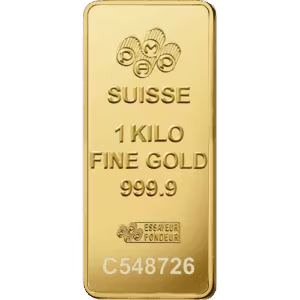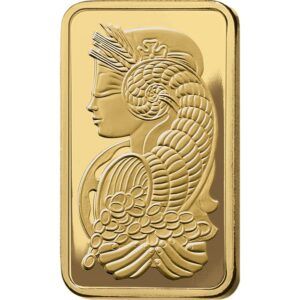Why a 1 Kilo Gold Bar is a Good Investment
Posted on — Leave a commentThe 1 kilo gold bar sits in the perfect middle ground for serious precious metals investors. It’s large enough to offer lower per-ounce premiums than smaller bars, yet manageable enough for individual ownership and storage. Consequently, this size has become a global standard in precious metals markets. Major refineries worldwide produce 1 kilo bars to identical weight and purity standards, though dimensions and finishes may vary slightly between cast and minted forms. This guide covers everything you need to know about 1-kilo gold bars, from exact specifications to authentication features and how they fit into a precious metals portfolio.
What Is a 1 Kilo Gold Bar?
The 1000-gram gold bar didn’t become the world’s preferred investment size by accident: it represents decades of market evolution toward the most practical bullion format.
The Metric Standard
The 1000-gram format emerged as the international bullion standard during the late 20th century as global precious metals markets became increasingly interconnected through improved communication technology and international banking systems. Previously, different countries used varying weight systems, such as British troy ounces, Chinese taels, Indian tolas, creating confusion when trading across borders. A bar weighed in London using troy ounces needed conversion when sold in Asia using different measurements. The metric kilogram provided a universal standard that eliminated these conversion errors and streamlined international transactions. Major trading centers could now price, weigh, and verify bars using identical measurements, reducing costs and increasing market efficiency.
Ounce Conversion for US Investors
For American investors accustomed to thinking in ounces, a 1-kilo gold bar contains exactly 32.15 troy ounces. The familiar ounce framework helps investors understand exactly what they’re purchasing without getting lost in metric conversions.
Investment Positioning
The 1-kilo bar of gold fills a crucial gap in the bullion market. It’s substantially larger than popular retail sizes like 100-gram bars or 10-ounce bars, yet far more accessible than institutional 400-ounce Good Delivery bars that typically require vault storage and minimum account balances. This positioning makes 1 kilo bars ideal for serious individual investors seeking efficiency without institutional requirements.
Global Acceptance
Major refineries worldwide, from PAMP Suisse to Perth Mint, produce 1 kilo bars because this size offers the optimal balance of production efficiency and market demand. The bars are large enough to justify the refining and certification costs while remaining small enough for individual investors to purchase and store. Banks, dealers, and investors globally recognize this standardized size, meaning you can sell a PAMP 1 kilo bar in New York just as easily as in Singapore or London.
1 Kilo Gold Bar Physical Specifications
Investment-grade gold bars are precision-manufactured products built to exacting international standards.
Exact Measurements
All 1-kilo gold bars contain exactly 1,000 grams of fine gold, but their physical dimensions vary depending on the refinery and whether the bar is cast or minted. Cast 1 kilo bars are compact and thicker, typically measuring around 80 mm × 40 mm × 18 mm (about 3.1″ × 1.6″ × 0.7″). Minted 1 kilo bars are flatter and larger in surface area, usually about 117 mm × 53 mm × 8–10 mm (about 4.6″ × 2.1″ × 0.3–0.4″). While dimensions differ slightly between PAMP, Valcambi, Perth Mint, and other refiners, both cast and minted kilo bars are designed to balance handling convenience with efficient vault storage.
Weight Precision
Investment-grade 1-kilo bars must weigh 1000.0 grams within strict tolerance limits, typically ±0.1 grams. This precision ensures accurate pricing and eliminates disputes during transactions. Similar precision standards apply across all precious metals, from silver bars of various sizes to gold bars.
Purity Requirements
The industry standard for investment-grade bars is .9999 fine gold, meaning 99.99% pure gold content. This “four nines” purity level represents the highest commercial standard available. Some refineries achieve .99999 purity, but .9999 remains the accepted benchmark for international trading. Watch this video to see how 99.99% pure gold bars are made and understand the precision manufacturing process behind these investment-grade products.
Surface Characteristics
1 kilo bar of gold bullion comes in two main finishes: cast and minted, each reflecting different production methods and cost considerations. Cast bars are poured directly into molds, creating a rougher, more industrial appearance with slight surface irregularities. This simpler process makes them less expensive to produce, so they typically carry lower premiums over spot gold prices. Minted bars undergo additional machining steps to create smooth, mirror-like surfaces with crisp edges and detailed engravings. The extra production costs result in higher premiums, but many investors prefer their polished appearance and precise details. Both types of bars meet identical purity and weight standards so investors’ choice depends on whether they prioritize lower cost or premium aesthetics.
Major 1 Kilo Gold Bullion Bar Manufacturers
While dozens of refineries produce 1-kilo gold bars, a select few have earned global recognition for exceptional quality and security features that command premium prices in international markets.
PAMP Suisse Leadership
PAMP Suisse stands as a strong market leader in premium precious metals refining, with its 1-kilo bar of gold bullion representing the gold standard for serious investors.
Background and Swiss Heritage
PAMP (Produits Artistiques Métaux Précieux) was founded in 1977 in Ticino, Switzerland, by a group of precious metals specialists who recognized the growing demand for investment-grade bullion products. The company revolutionized the industry by focusing on artistic designs and advanced security features rather than simply producing plain bars. Within a decade, PAMP had become the world’s leading brand name in precious metals, processing over 450 tons of gold annually. The company’s Swiss heritage carries significant weight in precious metals markets, as Switzerland’s centuries-old reputation for precision manufacturing and financial stability translates directly into market confidence. This reputation allows PAMP bars to command higher premiums than competitors, as investors pay extra for the Swiss quality assurance and the security that comes with Swiss financial tradition.
Fortuna Design
The Suisse 1 kilo gold bar features PAMP’s Lady Fortuna design, portraying the Roman goddess of good fortune with gently curvilinear lines that seamlessly integrate with the bar’s rectilinear borders. The design incorporates her ancient symbols of prosperity: a sheaf of wheat, the poppy flower, the Horn of Plenty, the Wheel of Fortune, and the Hands of Fortune that share her benevolence. This exceptional economy of space showcases PAMP’s artistic philosophy: that precious metals products should be beautiful works of art, not merely functional bullion.

Image: PAMP Suisse Lady Fortuna 1 kilo gold bar showing the detailed Roman goddess design with wheat sheaf, horn of plenty, and intricate relief work.
Source: PAMP
Veriscan Technology
PAMP pioneered advanced anti-counterfeiting technology with its Veriscan system. Each bar features a unique digital fingerprint created during production, allowing authentication through a smartphone app. This technology provides unprecedented security and has set the industry standard for modern bullion authentication.
Production Standards
PAMP maintains LBMA Good Delivery accreditation, meeting the London Bullion Market Association’s strict standards for purity, weight, and appearance. This accreditation ensures global acceptance and liquidity for PAMP bars in any major precious metals market.
Other Recognized Refineries
While PAMP sets the premium standard, several other world-class refineries produce 1 kilo bar of gold bullion that command global respect and recognition.
Valcambi
This Swiss competitor takes a distinctly different design approach, featuring clean, modern aesthetics rather than classical imagery. Their bars often showcase geometric patterns and contemporary styling while maintaining the same Swiss quality standards that make them globally accepted.
Metalor
With traditional banking heritage dating back to 1852, Metalor brings old-world Swiss craftsmanship to modern bullion production. Their bars feature a clean, minimalist design approach that emphasizes function over decoration. The simple layout includes essential information like weight, purity, and serial numbers in straightforward typography.
Perth Mint
Founded in 1899 as a branch of Britain’s Royal Mint, the Perth Mint is Australia’s official bullion producer and one of the oldest operating mints in the Southern Hemisphere. The Mint produces 1 kilo gold bars that carry both LBMA and COMEX accreditation, ensuring international recognition. While their larger wholesale bars are plain in design, Perth’s retail-oriented kilo bars often feature their swan logo and meticulous finishing. Investors value the Perth Mint’s sovereign backing by the Government of Western Australia, which provides an additional layer of trust and security. Those seeking to buy 1 kilo gold bar products with government guarantees often choose Perth Mint for this assurance.

Image: Perth Mint precious metals bars showing size comparison from 1 1-kilo bar of gold and silver down to smaller fractional sizes with swan logos.
Source: Perth Mint
Royal Canadian Mint
The Royal Canadian Mint, established in 1908, is a world leader in minting innovation and security. Its 1 kilo gold bars are recognized globally for purity and precision, benefiting from RCM’s industry-leading refining capacity (able to produce gold of .99999 fineness, among the purest in the world). The bars feature advanced security features such as precision radial lines and laser-engraved micro-engraving, building on the same technology RCM applies to its Maple Leaf coins. Investors are drawn to RCM products not only for their exceptional quality but also for the sovereign guarantee of the Government of Canada.
Authentication and Security Features
Authenticating a 1-kilo gold bullion bar requires understanding the sophisticated security measures that separate genuine investment-grade products from counterfeits flooding the market.
Serial Numbers
Every legitimate 1-kilo gold bar carries a unique serial number that links directly to the refinery’s production records. These numbers vary by manufacturer – for instance, PAMP uses alphanumeric codes, while Perth Mint uses purely numeric sequences. The serial number should be deeply stamped or engraved, never just surface-etched, and match the refinery’s documented format exactly.
Assay Certificates
Genuine bars come with official assay certificates that detail weight, purity, and production information. These certificates feature security elements like watermarks, special paper, and unique identifiers that match the bar’s serial number.
Packaging Integrity
Many leading refiners seal bars in tamper-evident plastic packaging with unique security features. PAMP’s Veriscan packaging includes QR codes for smartphone verification, while other manufacturers use heat-sealed plastic with distinctive markings. Any signs of resealing or altered packaging should raise immediate red flags.

Image: PAMP Suisse Veriscan authentication system showing hands using smartphone app to verify gold bars with QR codes and security packaging.
Source: MKS Pamp
Verification Methods
Professional authentication involves precise weight measurements (genuine bars weigh 1000 g within a very tight tolerance), dimensional checks, and magnetic testing. Gold is not magnetic, so any attraction to magnets indicates fake content. Sound tests (as genuine bars produce a distinct ringing tone when struck) may provide additional verification.
Counterfeiting Concerns
Common fake indicators include incorrect fonts, misspelled text, wrong dimensions, and tungsten cores designed to mimic gold’s weight. Always purchase from reputable dealers and verify all security features before completing transactions.
Investment Considerations for 1 Kilo Gold Bars
Understanding both the advantages and limitations of 1 kilo gold bars helps investors determine whether this size fits their portfolio strategy and financial situation. For a broader context on gold’s role in investment portfolios compared to stocks, consider how precious metals provide diversification benefits.
Advantages
Lower Premiums
1-kilo bars typically carry lower premiums over spot prices compared to smaller denominations like 100-gram bars. This cost efficiency becomes increasingly significant on larger purchases, where even modest percentage differences can translate into substantial savings. When evaluating the 1-kilo 24k gold bar price, factor in these premiums over the base spot price.
Storage Efficiency
These bars maximize gold content relative to their size, making them ideal for investors with limited safe or vault space. Compared to holding the same weight in multiple smaller bars, a single 1-kilo bar is more compact, easier to transport, and often cheaper to insure.
Global Recognition
Major dealers and institutions worldwide accept 1 kilo bars from reputable refineries without hesitation. This universal acceptance ensures liquidity whether you’re selling in New York, London, or Singapore.
Considerations
Higher Entry Cost
Purchasing a 1-kilo bar requires a considerable upfront outlay, making it one of the more capital-intensive ways to invest in physical gold. This level of commitment may not be practical for every investor, and it often requires careful consideration of overall portfolio balance, liquidity needs, and long-term goals. For those building retirement portfolios, consider how gold and silver can be included in IRA accounts to maximize tax advantages.
Liquidity Timing
Accredited 1-kilo bars are globally recognized and highly liquid with professional dealers and institutions. However, in private resale markets they may take longer to move than smaller bars, since fewer individual buyers are able to purchase such a high-value piece outright.
Storage and Handling Guidelines
Proper storage and handling protect your 1-kilo gold bar value and ensure these valuable assets remain in pristine condition for future resale. For comprehensive guidance, review Blanchard’s precious metals storage guide.
Physical Handling
Always handle bars with clean cotton gloves to prevent fingerprints and oils from damaging the surface. Support the full weight when lifting and never grip by edges alone. Store bars in their original protective packaging whenever possible, as removing them unnecessarily increases scratch risk and may affect resale 1 1-kilo gold bar value.

Image: Hand in white glove holding gold bar above a collection of stacked gold bars demonstrating proper handling techniques for precious metals.
Source: Deutsche Welle
Home Storage
For private storage, use a high-quality safe with a recognized burglary rating such as TL-15 or higher. The safe should be professionally installed, ideally anchored into concrete, and fire-resistant. Keep the storage location confidential and avoid drawing attention to your holdings.
Professional Storage
Depository services offer allocated or segregated storage, ensuring your specific bars remain individually identified. Leading depositories provide allocated storage with detailed documentation, insurance coverage, and regular auditing. This option eliminates home storage risks while maintaining direct ownership.

Image: Gold bars stored in a bank safe deposit box showing secure storage of precious metals with numbered compartments.
Source: Metals Edge
Insurance Planning
Standard homeowners’ insurance rarely covers precious metals adequately. Obtain separate valuable items coverage or specialized precious metals insurance. Document everything with photographs, serial numbers, and purchase receipts. Store documentation separately from the physical bars to ensure access during claims.
Conclusion
The 1-kilo gold bar represents the optimal balance between cost efficiency and accessibility for serious precious metals investors. With standardized weight, .9999 fine gold purity, and rigorous authentication features, these bars offer lower premiums and maximum storage efficiency compared to smaller denominations.
For investors seeking substantial precious metals exposure with institutional-quality products, 1 kilo gold bars deliver unmatched efficiency and professional credibility. Explore Blanchard’s selection of 1-kilo gold bars and other precious metals to build your portfolio with confidence.
FAQs
1. How much is a 1-kilo gold bar worth?
1 kilo gold bar price equals the current spot price of gold multiplied by 32.15 troy ounces. Since gold prices fluctuate daily based on market conditions, the bar’s worth changes constantly with the precious metals markets.
2. How many ounces are in a 1-kilo gold bar?
A 1-kilo gold bar contains exactly 32.15 troy ounces.
3. What are the dimensions of a 1-kilo gold bar?
A 1-kilo gold bar contains exactly 1,000 grams of fine gold, but its dimensions vary by refinery and whether it is cast or minted. Cast bars are typically more compact, around 80 mm × 40 mm × 18 mm (3.1″ × 1.6″ × 0.7″), while minted bars are flatter, about 117 mm × 53 mm × 8–10 mm (4.6″ × 2.1″ × 0.3–0.4″).








